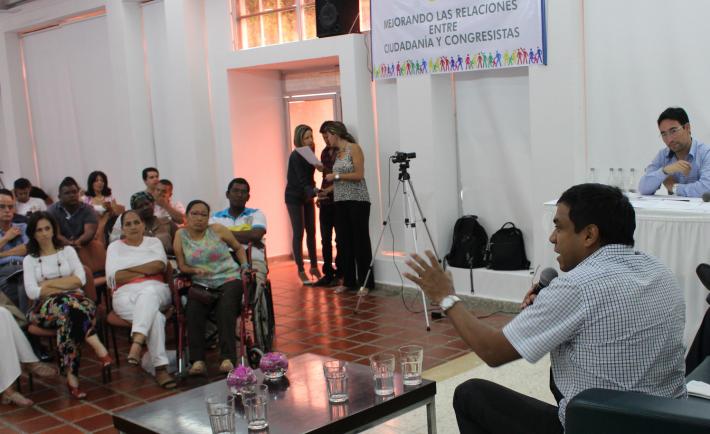
Citizens and congressmen meet in the department of Bolivar, Colombia to discuss issues and improving relations.
Each week NDI’s Citizen Participation team provides a resource to assist NDI staff in meeting the objectives of their programs. This past month's resources described the need for integrative strategies for citizen-led accountability, outlined an assessment framework to identify government accountability gaps, introduced a learning and advocacy framework for disability-inclusive development, and convened resources on cross-sectoral and evidence-based approaches to positive youth development. These resources provide tools and insights that can help citizens and civil society strengthen their ability to increase government accountability and bring about inclusive developmental change.
 Connecting the Dots for Accountability: Civil Society Policy Monitoring and Advocacy Strategies published by the Transparency and Accountability Initiative describes the need for campaigns that integrate different forms of activism when advancing accountability agendas. It draws on the experiences and insights shared by development researchers and practitioners during a June 2015 international workshop on strategic approaches to citizen-led accountability. The workshop explored how CSO efforts could ‘connect the dots’ in ways that involve multiple actors, tools and tactics, and levels of governance, in order to make government more responsive and accountable. The report includes a conceptual framework for connecting the dots and five case studies of integrative CSO strategies.
Connecting the Dots for Accountability: Civil Society Policy Monitoring and Advocacy Strategies published by the Transparency and Accountability Initiative describes the need for campaigns that integrate different forms of activism when advancing accountability agendas. It draws on the experiences and insights shared by development researchers and practitioners during a June 2015 international workshop on strategic approaches to citizen-led accountability. The workshop explored how CSO efforts could ‘connect the dots’ in ways that involve multiple actors, tools and tactics, and levels of governance, in order to make government more responsive and accountable. The report includes a conceptual framework for connecting the dots and five case studies of integrative CSO strategies.
 Accountability in WASH: Explaining the Concept published by UNICEF argues that improved governance, with clear roles and responsibilities of all actors involved, is critical for improving the quality and sustainability of water and hygiene (WASH) service delivery. The report argues that the budget and available resources are often not what constrains service delivery; rather it is the lack of good governance practices. Unequal, inappropriate, unaffordable and poor quality services may continue without collective action citizen and community action. The report provides an assessment framework to help identify accountability gaps, set specific targets, and develop recommendations and opportunities for collective action.
Accountability in WASH: Explaining the Concept published by UNICEF argues that improved governance, with clear roles and responsibilities of all actors involved, is critical for improving the quality and sustainability of water and hygiene (WASH) service delivery. The report argues that the budget and available resources are often not what constrains service delivery; rather it is the lack of good governance practices. Unequal, inappropriate, unaffordable and poor quality services may continue without collective action citizen and community action. The report provides an assessment framework to help identify accountability gaps, set specific targets, and develop recommendations and opportunities for collective action.
 Making it Work: Good practices for disability-inclusive development and humanitarian action published by Handicap International introduces a learning and advocacy framework called “Making it Work,” designed to help citizens and civil society advance the principles enshrined in the Convention on the Rights of Persons with Disabilities (CRPD) and the social and political inclusion of people with disabilities (PWDs) more broadly. In order to influence systemic change and empower PWDs, the Making it Work process will achieve the best results when it is led or co-led by PWDs themselves. Although the process was created to advance the rights and inclusion of PWDs as envisaged in the CRPD, it can be applied to inclusion and advocacy efforts of all marginalized groups.
Making it Work: Good practices for disability-inclusive development and humanitarian action published by Handicap International introduces a learning and advocacy framework called “Making it Work,” designed to help citizens and civil society advance the principles enshrined in the Convention on the Rights of Persons with Disabilities (CRPD) and the social and political inclusion of people with disabilities (PWDs) more broadly. In order to influence systemic change and empower PWDs, the Making it Work process will achieve the best results when it is led or co-led by PWDs themselves. Although the process was created to advance the rights and inclusion of PWDs as envisaged in the CRPD, it can be applied to inclusion and advocacy efforts of all marginalized groups.
 YouthPower.org by USAID supports and strengthens cross-sectoral initiatives to improve young people’s lives by convening resources from youth development programs. It includes the latest news, events, and technical materials on cooperative and evidence-based approaches to youth development and a community learning network for practitioners. The online platform is a product of USAID’s agency-wide YouthPower initiative, which seeks to improve the capacity of youth-led and youth-serving institutions. A diverse group of development actors across the world are engaged in the YouthPower initiative, all of whom will continue to update the online learning hub with new materials to enhance youth development efforts.
YouthPower.org by USAID supports and strengthens cross-sectoral initiatives to improve young people’s lives by convening resources from youth development programs. It includes the latest news, events, and technical materials on cooperative and evidence-based approaches to youth development and a community learning network for practitioners. The online platform is a product of USAID’s agency-wide YouthPower initiative, which seeks to improve the capacity of youth-led and youth-serving institutions. A diverse group of development actors across the world are engaged in the YouthPower initiative, all of whom will continue to update the online learning hub with new materials to enhance youth development efforts.
